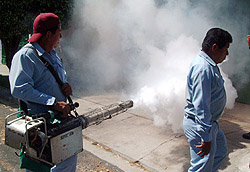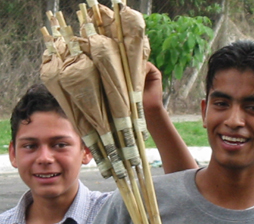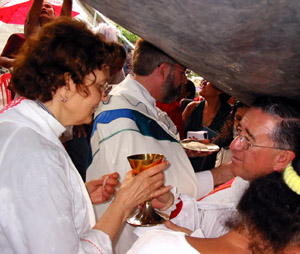Return to top of page
Return to Home Page
|
The Diocese of El Salvador is preparing ten young people to be lay evangelists in the diocese. After the training, these lay ministers plan to spend a year working in diocesan communities. With the vision of Bishop Martín Barahona, the staff of the Diocesan Centre as well as the Rev. Boanerges Rosa, head of the Provincial School of Theological Studies, has implemented an intensive effort at equipping these young saints for the work of the Gospel. While it is clear that evangelism is the task of all Christians, it is also clear that disciplined and well-equipped leaders can make a great difference in bringing this ministry to life in the Church.
Of the ten young persons selected to participate in this initial program, five students study the basic tenets of the Christian faith, an Anglican perspective of the Church, theology and methods of evangelism, skills as musicians including learning music theory and how to play the guitar, as well as other subjects.
Ed Schmitt, diocesan Programme Director, says, “a primary goal for this group is to develop a deeper sense of their personal spiritual life as well as gain an enhanced capacity in sharing the personal meaning of the faith with others. Students are in a process of reflection on their faith through Bible study, prayer, celebration, and dialogue”.
|
By K. Schmitt
It was maybe mid-May when the children in my Christian ed class heard the spray truck coming and raced outside to
see the action. I chased after them to try to save them from whatever chemicals were being discharged from the tank of the truck. Remembering how commonly we sprayed DDT in my childhood, I was not
sure exactly what was in these trucks. That added to the fact that chemical companies are notorious for dumping products outlawed in Europe and North America into developing countries.

I was unable to persuade the children to re-enter the church, but we did stand high above the street at the top
of the stairs that lead to the church of Santísima Trinidad and the pasajes beyond where hundreds of people live in the housing development of Santa Teresa. Not everyone at street level was
getting out of the way. Clouds of some kind of insecticide billowed out of the truck. I thought to myself, "of course all the mosquitos are up here on the hill breeding away in pilas," the concrete
sinks that families use for every kind of washing. These sinks are left full of water constantly. If they are not frequently drained, the mosquito larvae hatch and join the host of flying creatures
that currently pose a threat that has reached epidemic levels in San Salvador.
In the Instituto Salvadoreño del Seguro Social, the public health hospitals, in San Salvador alone of 87
cases of dengue, 69 were from residents of the capital city. Medics were called to be on duty 24 hours a day to respond to patients arriving at hospitals.
Newspapers are filled with photos of dead or seriously ill children, grieving parents, and the crowded waiting
room at the Bloom Hospital where parents sit, sick babes in arms. Bloom is the main hospital for children in El Salvador. Photos also showed school children marching with placards of information
about dengue, and the Minister of Education and Health moving through neighbourhoods inspecting containers of water for larvae.
A variety of articles describe the symptoms of dengue: fever as high as 40 degrees centigrade that endures more
than four or five days, frequent pains in the muscles, particularly in the knees and ankles, a constant fierce headache and possible eye pain, and sometimes haemorrhaging in the nose and
gums.
A massive public education program has been launched. Preventive measures include washing pilas and water barrels
every three days, the destruction of objects that retain rain water that may be in the area of one's house, wearing long pants, and the reporting of any unoccupied dwellings where pilas might have
unchanged water. An appeal went out to residents to allow fumigation by the Department of Health,

A state of emergency was declared on Friday, June 14, in the states of San Salvador, La Libertad, Santa Ana and
Cabañas. All government departments were called upon to assist the Department of Health, which had already availed itself of help from the Armed Forces for its spraying campaign. Members of
the Battalion of Military Health knocked on doors to raise consciousness about the disease and preventative measures. Emergency medical teams were flown in from Mexico, and others were expected from
Cuba.
Dengue is common in Latin American countries. However, last year areas that did not have problems with the disease, such as Honduras, Nicaragua, Panama, Ecuador,
Colombia, and Venezuela this year are facing problems with the disease. All areas that struggled against Dengue last year, continue to have the problem this year, with the exception of Cuba.
|
Return to top of page
Return to Home Page
 The patronal festival of a parish in El Salvador is an essential way of affirming the life of the community. It has the character of a homecoming celebration in which many people who have roots in the parish return to participate. Doña Mercedes, don Xuipilo and the other elders of the parish are there testifying to the importance of this activity; however, by far the largest part of the congregation is made up of young people. The members are again making a commitment to move forward with the mission of the Church in El Mango, Cuilapa and Colonia Nueva, the hamlets that make up the parish.
 Bishop Martín Barahona presides at the celebration of the Eucharist and Baptism. As well people are confirmed and others received into the communion of the Anglican tradition. These dignified festivities and ceremonies have an integral relaxed feeling. Instead of the smoke of incense wafting through the church the sweet smell of the burning hardwood fires steaming the tamales placed just outside the church provide us with the scent of celebration. In the church garden along with the regular horses are several oxen and their cart that is needed to transport the heavy caldrons in which the food is prepared.
The Church is integral to the lives of this and many rural communities in El Salvador. I have the privilege of being able to serve in one of these.
Edward Schmitt
|
 While delegates deliberate world trading interests at the Kananaskas summit, Maritza Hernández works quietly with little groups of impoverished Salvadorians to create very small businesses. Licenciado Hernández, the diocesan social worker, enters communities in which the church is active and identifies people in need who have interest in setting up small co-operatives. After training and making a business plan, the diocese gives very small loans to help implement these “micro-empresas.”
While delegates deliberate world trading interests at the Kananaskas summit, Maritza Hernández works quietly with little groups of impoverished Salvadorians to create very small businesses. Licenciado Hernández, the diocesan social worker, enters communities in which the church is active and identifies people in need who have interest in setting up small co-operatives. After training and making a business plan, the diocese gives very small loans to help implement these “micro-empresas.”
A recent article in San Salvador daily, El Diario de Hoy, suggests that widely changing business policies and practices appear as a major cause of increased poverty for the rural populations in El Salvador. The article lists the level of U. S. Government subsidy for various basic cereal crops that graphically reveals the distortion of the market caused by unequal subsidies. Wheat, corn (maize), rice, beans among other foods, according to El Diario, receive U. S. Government subsidies in a range between 45 and 55%. (At this writing, Canada is attempting to raise the support for Canadian farmers.) Central American farmers, who do not receive government subsidies, and whose governments have entered into trade agreements that have cut import tariffs, cannot compete in this market.
Salvadorian campesinos subsist on home-made whole-grain tortillas made from the corn from milpas (fields), along with home-grown dried beans. However, there is little incentive to grow basic commodities to sell at prices depressed by dumping from rich nations.
Clearly, no simple answers exist for this situation. Commodity prices have been falling for at least one hundred years, affecting farmers in Canada, the USA and other developed nations. At the same time, in developing nations such as El Salvador, farming families face malnutrition and deep personal insecurity.
The people of the Church in both El Salvador and the North need to understand the effects of decisions about economy and trade in order to witness for justice for all people in the evolving world community.
|
The church committee of Iglesia Santísima Trinidad is looking at opening a visual health clinic. Because many people here have incomes less than $100 per month, the cost of a pair of glasses often is beyond the family’s resources.
The group, headed by Nelson Currasco, is working with an optical health project from France. Four young adults will be trained to examine eyes and prepare lenses for members of the community at low cost. The Junta Directiva of the local neighbourhood, the Colonia Santa Teresa, has offered a small house free of charge for the clinic group’s use until the new building of Santísima Trinidad Parish is completed.
The committee must find the funding for training of the personnel at $40 per month each for six months, and for the purchase of optical equipment and materials. A parish friend from the United States may also be able to obtain optical equipment through the organisation where she works. The equipment must be found before the training can start.
Fees for optical services in the new clinic will range from five to forty-five dollars US, the top price being for bifocals.
In a recent meeting Primate-elect Martín Barahona, affirmed the program as a positive ministry of the congregation. The committee discussed the possibility of extending the project to other Anglican churches.
|
01-07-2002
|
 With skyrockets zooming past electric wires to explode high above them, the people of Iglesia
Santísima Trinidad began to process through Colonia Santa Teresa in San Martín where the church is located.
With skyrockets zooming past electric wires to explode high above them, the people of Iglesia
Santísima Trinidad began to process through Colonia Santa Teresa in San Martín where the church is located. As the church itself is too small for a group this large, the festival
service took place outside under plastic sheeting that had been strung up to protect the principal players (bishops, clergy, and persons to receive baptism, confirmation and reception) from the sun.
Everyone else either stood or sat in chairs placed in the wide avenue that fronts onto the church property.
As the church itself is too small for a group this large, the festival
service took place outside under plastic sheeting that had been strung up to protect the principal players (bishops, clergy, and persons to receive baptism, confirmation and reception) from the sun.
Everyone else either stood or sat in chairs placed in the wide avenue that fronts onto the church property.



 While delegates deliberate world trading interests at the Kananaskas summit, Maritza Hernández works quietly with little groups of impoverished Salvadorians to create very small businesses. Licenciado Hernández, the diocesan social worker, enters communities in which the church is active and identifies people in need who have interest in setting up small co-operatives. After training and making a business plan, the diocese gives very small loans to help implement these “micro-empresas.”
While delegates deliberate world trading interests at the Kananaskas summit, Maritza Hernández works quietly with little groups of impoverished Salvadorians to create very small businesses. Licenciado Hernández, the diocesan social worker, enters communities in which the church is active and identifies people in need who have interest in setting up small co-operatives. After training and making a business plan, the diocese gives very small loans to help implement these “micro-empresas.”